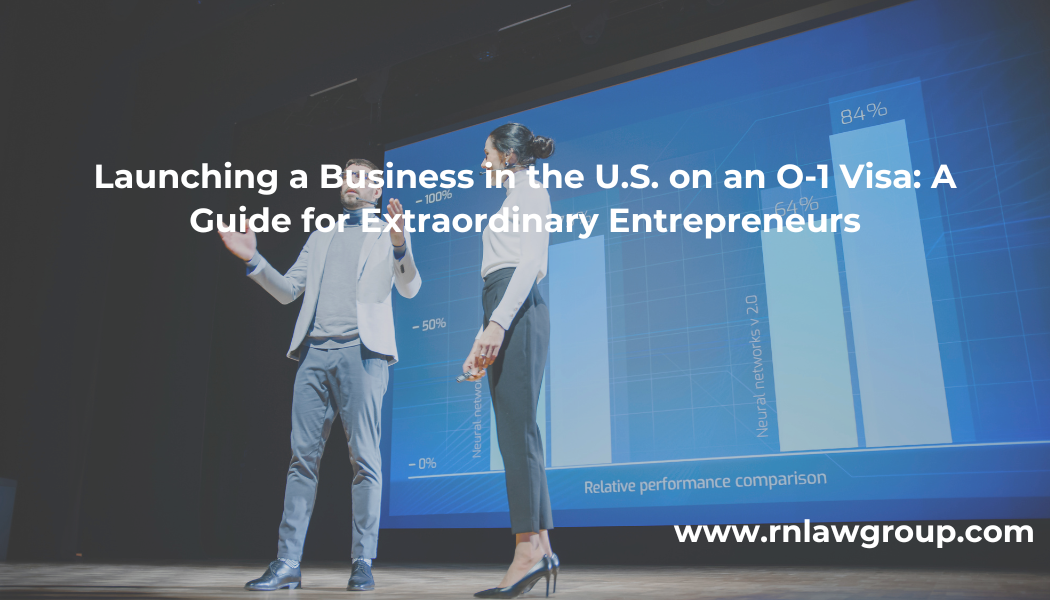
Launching a Business in the U.S. on an O-1 Visa: A Guide for Extraordinary Entrepreneurs
Starting a business in the U.S. is an exciting venture—especially for those with exceptional talent. If you’ve earned national or international acclaim in your field, the O-1 visa presents a compelling pathway to bring your entrepreneurial vision stateside. Below is an overview of how the O-1 can be leveraged to build and lead a business in the U.S.
What Is the O-1 Visa—And Who Qualifies?
The O-1 visa is a non-immigrant classification reserved for individuals with extraordinary ability in science, education, business, or athletics (O-1A), or in the arts and entertainment (O-1B). To qualify, applicants must show they are among the small percentage who have risen to the very top of their field, with recognition at the national or international level.
An applicant may qualify either through a one-time, major, internationally recognized award (such as a Nobel Prize) or by meeting at least three of the following criteria:
- Receipt of nationally or internationally recognized prizes or awards for excellence in the field.
- Membership in associations that require outstanding achievement, as judged by recognized experts.
- Published material about the applicant and their work in professional publications or major media.
- Participation as a judge of others’ work in the same or a related field.
- Original scientific, scholarly, or business-related contributions of major significance.
- Authorship of scholarly articles in professional journals or other major media.
- Employment in a critical or essential capacity for organizations or establishments with a distinguished reputation.
- High salary or other significantly high remuneration compared to others in the field.
These requirements are meant to ensure that O-1 classification is reserved for individuals who have demonstrated sustained acclaim and impact.
Eligible Petitioners
A key part of the O-1 process is determining who can act as the petitioner. A U.S. employer may file Form I-129 on behalf of the beneficiary, or a U.S. agent may serve as the petitioner in certain scenarios, such as when the beneficiary will be self-employed, engaged in short-term projects, or employed through a foreign company that designates the U.S. agent to act on its behalf. This flexibility is particularly important for entrepreneurs, as it allows for arrangements where the founder can work for a company they have established in the U.S., provided that an appropriate employer–employee relationship is in place.
Can You Start and Run Your Own Business?
Entrepreneurs often ask whether they can form, own, and operate the U.S. company that will serve as the petitioner for the O-1 visa application. The answer is yes, but there are important limitations. While it is permissible to own and incorporate a U.S. business and have it function as the O-1 petitioner, the founder cannot serve as the sole authority over their own employment. Instead, there must be a bona fide employer–employee relationship, typically established through other owners/partners or a corporate board or other governance structure with the ability to hire, fire, or otherwise oversee the beneficiary’s work. This ensures that the petitioning entity has genuine control over the terms of employment, consistent with USCIS requirements.
Building a Strong Visa Case for Your Startup
For startup founders, demonstrating the credibility and legitimacy of the enterprise is an important part of the O-1 petition. Evidence such as significant venture capital or angel investment, government funding, or prestigious awards and grants, in addition to a detailed business plan, can help establish the company’s reputation and growth potential. USCIS has recognized that such evidence is often highly relevant in evaluating extraordinary ability petitions for entrepreneurs, particularly in technology and innovation-driven sectors. The more compelling the documentation of your company’s traction and recognition, the stronger your overall case will be.
Starting Your Business on O-1
The process of starting and running a business on an O-1 visa begins with assembling strong evidence of your extraordinary ability, including awards, media coverage, publications, or other documentation that shows your standing in the field. Once that evidence is in place, the next step is forming a U.S. entity with proper governance to establish an employer–employee relationship. From there, a U.S. employer or agent can file Form I-129 on your behalf, supported by both the extraordinary ability evidence and documentation that establishes the credibility of your startup. If approved, you may live and work in the U.S. for an initial period of up to three years, with the potential for one-year extensions thereafter.
O-3 Dependents
Spouses and unmarried children under 21 may accompany an O-1 visa holder to the United States in O-3 status. O-3 dependents are granted the same period of admission as the O-1 principal, and they may study while in the U.S. However, they are not eligible for work authorization. This is an important consideration for families planning their move, as dependent spouses will not be permitted to accept employment while in O-3 status.
Why the O-1 Makes Sense for Founders
The O-1 visa offers several advantages for entrepreneurs. Unlike the H-1B visa, it is not subject to an annual lottery or cap, allowing qualified individuals to apply year-round, and offers freedom from strict degree requirements. For founders who have already achieved significant recognition, the O-1 represents a merit-based, reliable option to bring their entrepreneurial vision to the U.S.
Pathway to a Green Card: EB-1A for Extraordinary Ability
For many entrepreneurs, the O-1 visa is just the beginning. A natural next step toward permanent residence is the EB-1A green card category, which is also designed for individuals of extraordinary ability. The EB-1A standard is slightly higher than that of the O-1, as it requires evidence not only of extraordinary ability but also of sustained national or international acclaim and achievements of major significance.
Unlike the O-1, the EB-1A allows for self-petitioning, eliminating the need for an employer or agent. Approval results in permanent residence, giving the entrepreneur freedom to live and work in the U.S. indefinitely. Many founders strengthen their EB-1A cases by highlighting evidence of their company’s funding, growth metrics, media coverage, and impact on their industry. For O-1 holders who continue to build their reputation and their business in the United States, the EB-1A provides a strong pathway to secure long-term stability.
By: Rebecca Chen
Rebecca Chen is a Partner at Reddy & Neumann. Her representation includes advising clients throughout the non-immigrant and immigrant visa application process, from initial filing, responding to various requests for evidence, and processing at overseas consulates. Her years of experience in the immigration field have made her a knowledgeable resource for complex business immigration matters.

